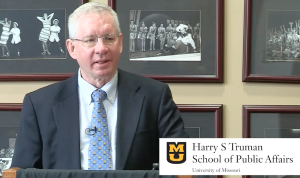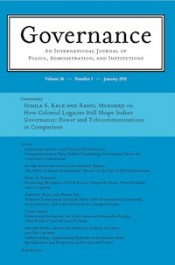How executives build power through consultation
Why do executives consult with interest groups? It isn’t just respect for the power of those groups, or democratic idealism. In the current issue of Governance,Adriana Bunea and Robert Thomson show how executives also use consultations as a device for bolstering their own bargaining power over legislators. The authors examine policymaking within the European Union, showing how consultation allows the European Commission to “claim more legitimacy and technical expertise than they otherwise could.” Read the article.
Video of Don Kettl lecture on “The Merit Principle in Crisis”
 Professor Don Kettl delivered a lecture at the Truman School of Public Affairs on October 1 based on his commentary for Governance, The merit principle in crisis. | Watch the video here | Read responses to this commentary.
Professor Don Kettl delivered a lecture at the Truman School of Public Affairs on October 1 based on his commentary for Governance, The merit principle in crisis. | Watch the video here | Read responses to this commentary.
When do bureaucrats’ preferences alter budgets?
 A substantial literature demonstrates how politicians’ preferences shape budget outcomes. But that literature neglects how bureaucrats might also shape those outcomes. In the current issue of Governance, Martin Baekgaard, Jens Blom-Hansenand Soren Serritzlew develop a more sophisticated model that examines the influence of both politicians and bureaucrats. In a study of Danish local governments, “political preferences trump bureaucratic ones on questions salient to the public” — but there is “no evidence that political preferences matter on less salient policy areas.” Read the article.
A substantial literature demonstrates how politicians’ preferences shape budget outcomes. But that literature neglects how bureaucrats might also shape those outcomes. In the current issue of Governance, Martin Baekgaard, Jens Blom-Hansenand Soren Serritzlew develop a more sophisticated model that examines the influence of both politicians and bureaucrats. In a study of Danish local governments, “political preferences trump bureaucratic ones on questions salient to the public” — but there is “no evidence that political preferences matter on less salient policy areas.” Read the article.Global governance: What Coen and Pegram don’t explain
 By Karthik Nachiappan. In a recent commentary for Governance, David Coen and Tom Pegram argue that the best way to improve global governance research is by synthesizing advances from three disciplines – International Relations, International Law and European Public Policy to enable scholars map, grapple with and overcome hindrances to global public policy-making. Though instructive, their agenda will not explain why ‘global governance is not working’ since their focus does not extend to the politics around the gridlock in global governance today.
By Karthik Nachiappan. In a recent commentary for Governance, David Coen and Tom Pegram argue that the best way to improve global governance research is by synthesizing advances from three disciplines – International Relations, International Law and European Public Policy to enable scholars map, grapple with and overcome hindrances to global public policy-making. Though instructive, their agenda will not explain why ‘global governance is not working’ since their focus does not extend to the politics around the gridlock in global governance today.
“Govern Like Us”: Reply to Wescott
 By M.A. Thomas. I appreciate the time Clay Wescott took to write a review of Govern Like Us: U.S. Expectations of Poor Countries, published in September in this journal. However, his review misses the central message of the book. Govern Like Us does not seek to explain varieties of governance and does not offer poverty as the sole explanatory factor. It is not a book about development, and so has little to say about the future growth and governance trajectories of low-income countries. On the contrary, it argues the need for a U.S. foreign policy to address the present: how poor governments govern now and will govern for decades at least.
By M.A. Thomas. I appreciate the time Clay Wescott took to write a review of Govern Like Us: U.S. Expectations of Poor Countries, published in September in this journal. However, his review misses the central message of the book. Govern Like Us does not seek to explain varieties of governance and does not offer poverty as the sole explanatory factor. It is not a book about development, and so has little to say about the future growth and governance trajectories of low-income countries. On the contrary, it argues the need for a U.S. foreign policy to address the present: how poor governments govern now and will govern for decades at least.
Needed: a new kind of global governance research
 “Global governance is not working,” David Coen and Tom Pegram of University College London say in a commentary in the current issue of Governance. And neither is global governance research. “The ‘global’ in governance remains largely terra incognita et obscura” for many academics, Coen and Pegram argue. “It is essential for social science scholars to grapple more fully with a globalizing governance reality.” Free access to the commentary.
“Global governance is not working,” David Coen and Tom Pegram of University College London say in a commentary in the current issue of Governance. And neither is global governance research. “The ‘global’ in governance remains largely terra incognita et obscura” for many academics, Coen and Pegram argue. “It is essential for social science scholars to grapple more fully with a globalizing governance reality.” Free access to the commentary.
Organizations are central to global governance
Coen and Pegram correctly highlight the dire need to advance research on global governance by advancing inter-disciplinary and combining multiple methods. They call for the integration of International Relations (IR)—for long the sole disciplinary approach used to study of global governance-, European Public Policy Studies (EPP), and International Law approaches. Their call for a new generation of global governance research is very timely.
Read the rest of this entry »
Written by Governance
October 19, 2015 at 8:59 am
Posted in Blog comments, Coen Pegram commentary